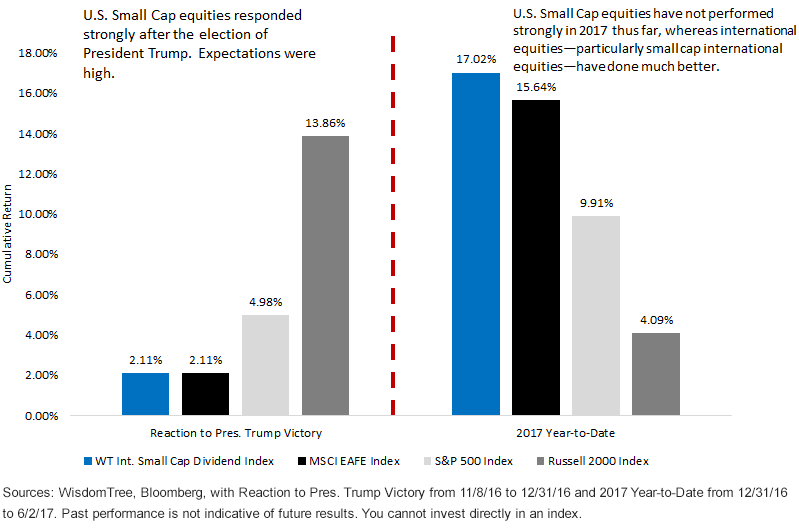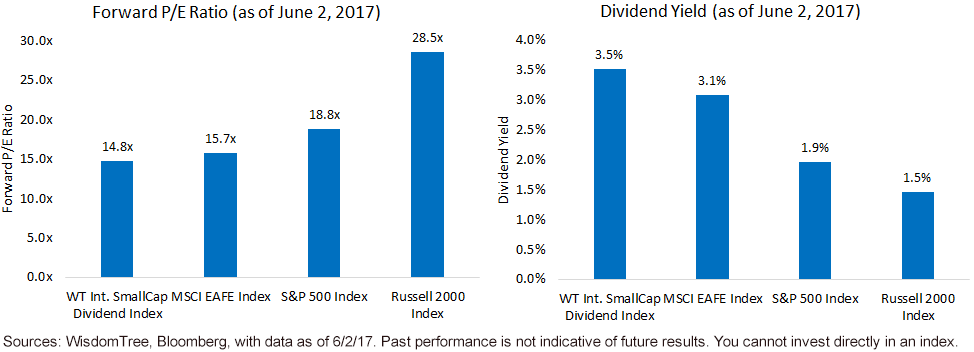Is the “Trump Trade” Finished?


While dramatic turns and surprises may make for great reality television and may be very helpful for media ratings, they are less than ideal in the markets. We’re now getting a lot of bombshells out of Washington, D.C., and it is becoming increasingly difficult to think that the pro-growth policies and “Trump agenda” are not at risk.
Trump Reflation Trade vs. What’s Worked in 2017

For definitions of indexes in the chart, visit our glossary.
Year-to-Date Reversals1
- The Russell 2000 Index was a rather dramatic market signal that showcased a strong response to President Trump’s November 8, 2016, victory, and there were a number of supportive catalysts for U.S. small-cap stocks after the election and at the end of the year. Rising rates—specifically, a rising U.S. 10-Year Treasury note yield—were driven by increasing growth expectations, something typically quite bullish for small-cap stocks. Additionally, corporate tax reform was seen as very possible given Republican majorities in both the U.S. House of Representatives and the Senate, and small-cap stocks tend to pay higher effective tax rates than large-cap stocks, thereby benefiting more from lower statutory rates. Also, the Bloomberg Dollar Index—a measure of the performance of the U.S. dollar against a diversified basket of currencies—was up 5.7% from November 8, 2016, to December 31, 2016. Since small caps derive the vast majority of their revenues from inside the U.S. rather than outside, this was yet another reason why the Russell 2000 Index did so well. In fact, there were 15 days in a row of positive gains on this index, the longest such streak since 1996.2
As of this writing (June 2, 2017):
- The U.S. 10-Year Treasury note interest rate has fallen since the start of 2017 from 2.44% to 2.15%.
- The Bloomberg Dollar Index is down 5.8%.
- With each passing week, it is looking more and more challenging for corporate tax reform to be completed in 2017.
So the Russell 2000 Index—the performance of which was one of the strongest symbols of the “Trump trade”—has faltered.
You Need to Take Risk to Put Yourself in the Way of Potential Rewards
It’s clear that, in the initial euphoria of President Trump’s victory, many international markets didn’t participate—and there wasn’t any strong reason why they should have. The Russell 2000 Index exemplified the “sentiment flows.”
For example, the specter of political risk in Europe was hanging over developed international markets. Even though for years we had been discussing the story supportive of developed international equities, it seemed like there was always a reason why the more expensive U.S. market was perceived to be less risky going forward. In other words, the higher multiples/valuations were “worth it” because the view of the market was that the rest of the world was riskier.
Now that we’re coming into the summer of 2017, we can see that those courageous and able to look beyond the apparent U.S. luster in the aftermath of President Trump’s victory—investing beyond U.S. borders even in the face of the perceived risks—have largely outperformed those who stuck with their home bias.
Not All Small-Cap Stocks Are in the U.S.
It seems like an obvious truth—and it’s noteworthy that the MSCI ACWI Small Cap Index is only 51% weighted to the U.S.3—but many investors that we speak to do all sorts of differentiated U.S. equity strategies and then simply “buy the benchmark” for their international exposures. For many, international small caps represent a new piece to their asset allocation puzzle.
Outperformance AND Lower Current Valuation
The MSCI EAFE Index is the most widely followed developed international benchmark that we tend to see in our discussions—and it has been doing well this year. But the WisdomTree International SmallCap Dividend Index has beaten it.

- For those investors who believe that the Trump agenda may be in trouble, why would they contemplate buying into (or holding) a market cap-weighted approach to U.S. small caps, such as the Russell 2000 Index, with a forward P/E ratio of nearly 29.0x? Developed international small caps are certainly not without risk—but at a forward P/E of approximately half as much, it’s possible that a lot of that risk has been priced in.
Align with the Momentum of the Summer
While these things are never certain, relative to where we were at the start of 2017, developed international markets are tending to shift from more negative to positive expectations. U.S. expectations were very positive and may be shifting to become more negative. Tapping into this shift with developed international small caps could bring helpful diversification into one's small-cap allocation.
1Unless otherwise noted, Bloomberg is the data source for all bullet points.
2Source: Lu Wang Lu, “U.S. Stocks Rise to Record as Trump Rally goes on for Third Week,” Bloomberg Markets, 11/25/16.
3Source: Bloomberg, with data as of 4/30/17, due to availability of monthly constituent data for MSCI indexes.
Important Risks Related to this Article
Foreign investing involves special risks, such as risk of loss from currency fluctuation or political or economic uncertainty.
Investments focusing on certain sectors and/or smaller companies increase their vulnerability to any single economic or regulatory development.
Diversification does not eliminate the risk of experiencing investment losses.

Christopher Gannatti began at WisdomTree as a Research Analyst in December 2010, working directly with Jeremy Schwartz, CFA®, Director of Research. In January of 2014, he was promoted to Associate Director of Research where he was responsible to lead different groups of analysts and strategists within the broader Research team at WisdomTree. In February of 2018, Christopher was promoted to Head of Research, Europe, where he was based out of WisdomTree’s London office and was responsible for the full WisdomTree research effort within the European market, as well as supporting the UCITs platform globally. In November 2021, Christopher was promoted to Global Head of Research, now responsible for numerous communications on investment strategy globally, particularly in the thematic equity space. Christopher came to WisdomTree from Lord Abbett, where he worked for four and a half years as a Regional Consultant. He received his MBA in Quantitative Finance, Accounting, and Economics from NYU’s Stern School of Business in 2010, and he received his bachelor’s degree from Colgate University in Economics in 2006. Christopher is a holder of the Chartered Financial Analyst Designation.

